Ryu Zhong's Blog - Posts Tagged "takuan"
Sung Hatsukoi, the Protagonist
Characters of Prince of Blue Flowers: Adventures of Takuan from Koto: Sung Hatsukoi
Hatsukoi is the protagonist of the ‘Prince of Blue Flowers’ and of the rest of the ‘Adventures of Takuan from Koto.’ The full story bears his monastic name which he got in the monastery on the Mount White.
Hatsukoi, like the celestial marten Ta-Guan, is a trickster. His monastic name – Takuan – he received for his tricks in honour of the heavenly trickster. But, unlike the marten, Takuan-Hatsukoi comprehends his destiny and applies his cunning to good deeds. This is how Hatsukoi first grows up, and then Takuan continues the path of becoming a whole person.
Story of Hatsukoi
Once upon a time, in the Sung family, an extraordinary child was born. He was given the name Hatsukoi which means ‘fruit of motherly love’.
Growing up, Hatsukoi can’t sit still. He plays tricks on his parents and other villagers and then goes wandering about. After a couple of pranks, he returns home, quite pleased with the results. But for some reason, his parents aren’t happy at all. They send him to a monastery. And in the monastery, he gets a new name – Takuan.
If you want to know what tricks Hatsukoi got sent to the monastery for, as well as what he did as Takuan, you have to listen to Prince of Blue Flowers: Adventures of Takuan from Koto.
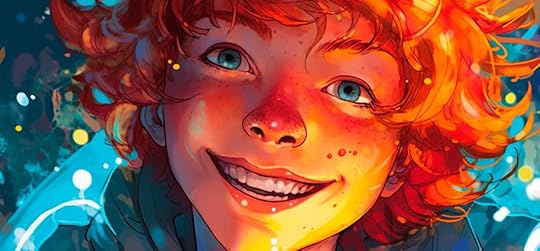
Hatsukoi is the protagonist of the ‘Prince of Blue Flowers’ and of the rest of the ‘Adventures of Takuan from Koto.’ The full story bears his monastic name which he got in the monastery on the Mount White.
Hatsukoi, like the celestial marten Ta-Guan, is a trickster. His monastic name – Takuan – he received for his tricks in honour of the heavenly trickster. But, unlike the marten, Takuan-Hatsukoi comprehends his destiny and applies his cunning to good deeds. This is how Hatsukoi first grows up, and then Takuan continues the path of becoming a whole person.
Story of Hatsukoi
Once upon a time, in the Sung family, an extraordinary child was born. He was given the name Hatsukoi which means ‘fruit of motherly love’.
Growing up, Hatsukoi can’t sit still. He plays tricks on his parents and other villagers and then goes wandering about. After a couple of pranks, he returns home, quite pleased with the results. But for some reason, his parents aren’t happy at all. They send him to a monastery. And in the monastery, he gets a new name – Takuan.
If you want to know what tricks Hatsukoi got sent to the monastery for, as well as what he did as Takuan, you have to listen to Prince of Blue Flowers: Adventures of Takuan from Koto.

Published on May 12, 2023 07:16
•
Tags:
characters, hatsukoi, prince-of-blue-flowers, takuan
Takuan’s Journey to the West
‘The most fascinating element about this book for me is the style of writing. The writer has a smooth and unique style. It’s artistic but not complicated. It’s a special book away from modern life and its hustle. It has this ancient eastern theme and takes you to a very different place.’
— Hager Salem, Online Book Club
Recently, we released the second volume of ‘Takuan’s Adventures,’ which goes by the title ‘Hunters of Weredemons.’ In the book, it becomes apparent that ‘The Adventures’ have lots in common with one of the four classic Chinese novels. ‘Journey to the West’ is the title of that novel, and to the modern reader, it’s known as ‘Son Wukong, the Monkey King’ or simply ‘Monkey.’
The similarities (and differences) between ‘Takuan’s Adventures’ and ‘Journey to the West’ are no coincidence, and I’ll tell you why.
When I was working on the sci-fi novel series ‘Demons Within,’ its world needed a story. A history even. This often happens with fictional worlds: just having a set of random facts isn’t enough, not only for the author and readers but also for the characters themselves.
Every thinking person, sooner or later, thinks about the past: about their own as well as about the days gone by. What will my heroes look back on? Where will they get knowledge about the past of their world?
Historical Novel, History Textbook, or a Fairy Tale?
I didn’t want to write historical treatises and dictionary encyclopedias. Reading those isn’t the most exciting thing to do either. Especially for the younger heroes of ‘Demons Within.’ So, I decided to give the story a more entertaining form.
The dominant culture of the ‘Demons’ world arose from a fusion of Asian traditions: Indian, Chinese, and Japanese. In their past, these traditions faced the same challenge that I did – to preserve the history of the world, they needed a medium that could be easily and happily passed down through the ages. This medium is an epic novel.
Indian ‘Ramayana’ and ‘Mahabharata’; Japanese ‘Kojiki’ and ‘Kujiki,’ ‘Nihongi’ and ‘Kaidans’; Chinese classic novels ‘Journey to the West,’ ‘Romance of Three Kingdoms,’ ‘Water Margin,’ and ‘Dream of the Red Chamber’ — here are perhaps the most famous of them. There’s plenty to choose from!
I chose with no hesitation: most of all, stories I love to read (and write!) about tricksters, cunning and foolish at the same time. Sun Wukong from ‘Journey to the West’ is just that: he fools both gods and demons, but he falls for their tricks as well. ‘Journey’ takes place both in the mortal world and in the Heavens, and by following this canon, I’ll have enough space for all the necessary details for the world building.
If you want to know more about the style ‘Takuan’s Adventures’ are written in, you must listen to the story in my personal blog.
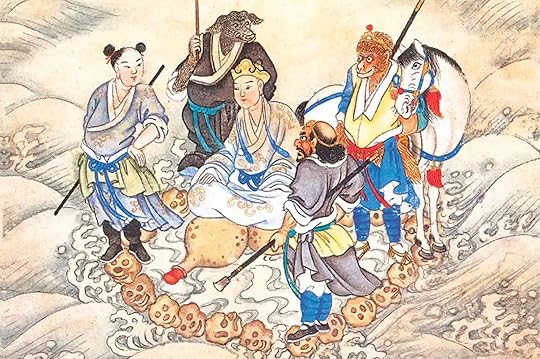
Published on May 15, 2023 00:46
•
Tags:
journey-to-the-west, prince-of-blue-flowers, takuan
Takuan from Koto
The runaway from the monastery, Takuan, appears before the reader as a teenager of around thirteen or fourteen years old, with red hair that he sometimes shaves off to pass himself off as a monk.
From a very young age, Takuan possessed cunning and restlessness, and during his time in the monastery, he learned how to use them for a good cause. Although this good cause was primarily for Takuan himself, only those who indulged in their vices – greed, anger, and ignorance – fell for his tricks.
If you want to find out about the adventures that befell Takuan, read the book called ‘Prince of Blue Flowers,’ and then its sequels: ‘Hunters of Weredemons’ and ‘Envoys of Celestials.’
And if you want to find a little more about Takuan himself, visit Takuan’s page on Makipedia.
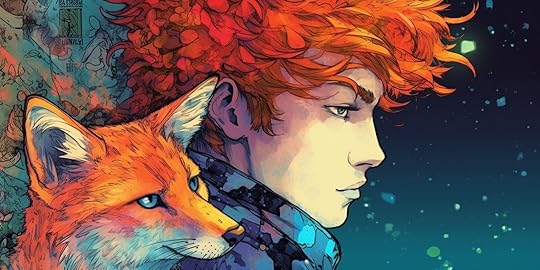
From a very young age, Takuan possessed cunning and restlessness, and during his time in the monastery, he learned how to use them for a good cause. Although this good cause was primarily for Takuan himself, only those who indulged in their vices – greed, anger, and ignorance – fell for his tricks.
If you want to find out about the adventures that befell Takuan, read the book called ‘Prince of Blue Flowers,’ and then its sequels: ‘Hunters of Weredemons’ and ‘Envoys of Celestials.’
And if you want to find a little more about Takuan himself, visit Takuan’s page on Makipedia.

Published on May 26, 2023 08:56
•
Tags:
characters, prince-of-blue-flowers, takuan
Gods and Celestials
Gods and celestials are creatures that dwell in the Heavenly Realm. The distinction between them is not always clear. Gods are sometimes referred to as celestials, but not all celestials are gods.
However, all of them reside in the Heavenly Realm, either in the Jade Palace itself, with countless rooms and halls, or in the vicinity. Celestials usually do not venture far from the palace, where various celebrations and festivities are constantly taking place.
Gods have been living in the Heavenly Realm since ancient times. Perhaps they were once humans, but this is truly unknown. What is known is that human desires are almost forgotten by them, as they exist in a world of rituals and myths.
Not all celestials are gods. Some of them are former humans who have attained immortality, forsaking worldly passions and thus ascending to the Heavenly Realm.
Occasionally, gods make exceptions and allow mortals to visit them, but such visits are short-lived; the simple guest of the gods never becomes a celestial.
If you want to know a little more about gods and celestials, you must visit their page on Makipedia.
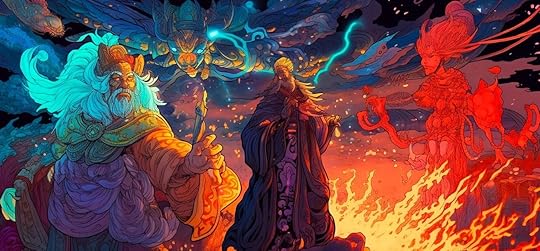
However, all of them reside in the Heavenly Realm, either in the Jade Palace itself, with countless rooms and halls, or in the vicinity. Celestials usually do not venture far from the palace, where various celebrations and festivities are constantly taking place.
Gods have been living in the Heavenly Realm since ancient times. Perhaps they were once humans, but this is truly unknown. What is known is that human desires are almost forgotten by them, as they exist in a world of rituals and myths.
Not all celestials are gods. Some of them are former humans who have attained immortality, forsaking worldly passions and thus ascending to the Heavenly Realm.
Occasionally, gods make exceptions and allow mortals to visit them, but such visits are short-lived; the simple guest of the gods never becomes a celestial.
If you want to know a little more about gods and celestials, you must visit their page on Makipedia.

Published on June 02, 2023 07:09
•
Tags:
takuan
Seven Lucky Gods
In Chinayindu, the Seven Gods of Luck are revered above all others, even more so than the wise and beautiful Goddess of the West. It is thanks to the Gods of Fortune that people were freed from the domination of weredemons who took over the Middle Realm after the Storm.
The Lucky Gods bestowed upon the Jade Emperor three hundred bottomless bags containing magical seeds. The Emperor himself distributed these bags among three hundred mountain monasteries, instructing the monks to plant a Fortune seed for each of the inhabitants.
The Lucky Seeds were not powerful enough to drive the weredemons out of the Earthen Realm, but those who had such a seed under their protection were no longer easy prey for the demons.
If you want to know a little more about these gods, you must visit their page on Makipedia.

The Lucky Gods bestowed upon the Jade Emperor three hundred bottomless bags containing magical seeds. The Emperor himself distributed these bags among three hundred mountain monasteries, instructing the monks to plant a Fortune seed for each of the inhabitants.
The Lucky Seeds were not powerful enough to drive the weredemons out of the Earthen Realm, but those who had such a seed under their protection were no longer easy prey for the demons.
If you want to know a little more about these gods, you must visit their page on Makipedia.

Published on June 10, 2023 01:27
•
Tags:
prince-of-blue-flowers, seven-lucky-gods, takuan
Tiel Ulenspiegel and Takuan
Till Eulenspiegel is a protagonist of a European narrative tradition. A German chapbook published around 1510 is the oldest known extant publication about the folk hero, but a background in earlier Middle Low German folklore is likely. The character may have been based on a historical person.
The literal translation of the High German name ‘Eulenspiegel’ is ‘owl mirror’ (hence owle-glasse). It is both innocuous and indicative of his character and has been explained as a garbled form of an expression for ‘wipe-the-arse’.
Till is depicted as trickster who plays practical jokes on his contemporaries, at every turn exposing vices, greed and folly, hypocrisy and foolishness. Although craftsmen are featured as the principal victims of his pranks, neither the nobility nor the pope is exempt from being affected by him.
It’s a great reference for Takuan whose vocation is to expose and exploit vices: ignorance, anger, and greed.
To learn more, visit the Makipedia.
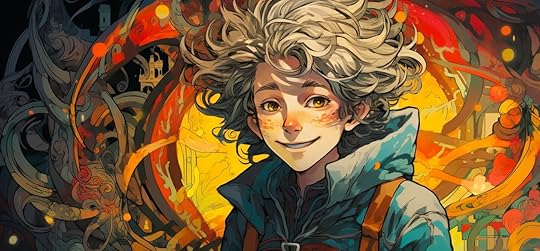
The literal translation of the High German name ‘Eulenspiegel’ is ‘owl mirror’ (hence owle-glasse). It is both innocuous and indicative of his character and has been explained as a garbled form of an expression for ‘wipe-the-arse’.
Till is depicted as trickster who plays practical jokes on his contemporaries, at every turn exposing vices, greed and folly, hypocrisy and foolishness. Although craftsmen are featured as the principal victims of his pranks, neither the nobility nor the pope is exempt from being affected by him.
It’s a great reference for Takuan whose vocation is to expose and exploit vices: ignorance, anger, and greed.
To learn more, visit the Makipedia.

Published on August 01, 2023 01:36
•
Tags:
takuan
Weredemons
Demons are just as sentient beings as deities and gods. They are not inherently evil, nor are they necessarily good (the same can be said about gods). However, humans usually depict them as evil, often due to the demons’ inherent selfishness.
Demons reside in the Under Realm, from where they can breach into other realms. Like deities, demons do not possess mortal bodies; they only possess celestial forms. In order to remain in the Earthen Realm, they require a body or a sacred vessel, much like the gods.
What Drives the Demons
Demons are driven by primal, animalistic passions. For instance, weredemons are always hungry, angry, and greedy. Demons are born from the depths of human passions, from the ‘three roots of evil.’ These passions cannot be completely satiated; they can only be dulled. Hence, passions guide the actions of demons.
Attitude towards Death
Demons are creations – creatures that were never born. They crave mortality and, at the same time, cannot endure it. Therefore, they cannot stay in the Earthen Realm for long and destroy the bodies they possess. Their insatiable thirst for death fuels their hunger, anger, and greed – especially towards mortals who possess what demons can never attain.
Now, Weredemons
When demons manifest in corporeal form (typically by possessing someone’s body), they take on a bestial shape, such as giant bears, wolves, badgers, and so on. They appear as a blend of human and animal, akin to werewolves.
One can envision weredemons as animals that have escaped from Heavens. They always assume a bestial form and give themselves animal names, such as Brother Leopard or Brother Jackal.
If you want to know a little more about different supernatural beings of the Anno Ruini universe, you must visit the Makipedia’s page on ‘Gods, demons, and others’.
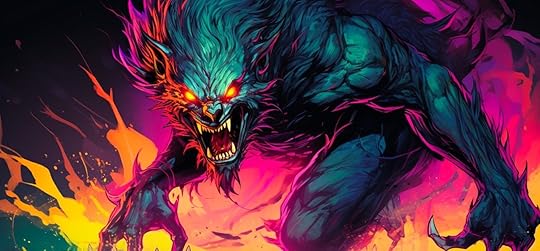
Demons reside in the Under Realm, from where they can breach into other realms. Like deities, demons do not possess mortal bodies; they only possess celestial forms. In order to remain in the Earthen Realm, they require a body or a sacred vessel, much like the gods.
What Drives the Demons
Demons are driven by primal, animalistic passions. For instance, weredemons are always hungry, angry, and greedy. Demons are born from the depths of human passions, from the ‘three roots of evil.’ These passions cannot be completely satiated; they can only be dulled. Hence, passions guide the actions of demons.
Attitude towards Death
Demons are creations – creatures that were never born. They crave mortality and, at the same time, cannot endure it. Therefore, they cannot stay in the Earthen Realm for long and destroy the bodies they possess. Their insatiable thirst for death fuels their hunger, anger, and greed – especially towards mortals who possess what demons can never attain.
Now, Weredemons
When demons manifest in corporeal form (typically by possessing someone’s body), they take on a bestial shape, such as giant bears, wolves, badgers, and so on. They appear as a blend of human and animal, akin to werewolves.
One can envision weredemons as animals that have escaped from Heavens. They always assume a bestial form and give themselves animal names, such as Brother Leopard or Brother Jackal.
If you want to know a little more about different supernatural beings of the Anno Ruini universe, you must visit the Makipedia’s page on ‘Gods, demons, and others’.

Published on August 23, 2023 06:24
•
Tags:
takuan
Magical Bulbs
From the magical perspective, demons (and other being beyond mortals) are kept — most often, imprisoned — in magical crystal bulbs.
The bulbs are about a size of a tennis or ping-pong balls — somewhere in between those two sizes. They are comfortably held by one held, though holding several bulbs in one hand is cumbersome.
When a bulb is held in a hand, the owner of the hand feels tingling, like if something trying to get into the skin.
The bulbs are fragile. If they are thrown against a wall, or dropped to a hard floor, they are smashed, and the content of it is released.
Certain magical powers are required to capture a demon into such a bulb. Common mortals or even celestials can't do that; some gods, however, can (not that they would do it). Yanwang is given powers to hunt demons and capture them in bulbs.
If you want to know the meaning of different colours of the bulbs, you must visit the Makipedia’s page about them.

The bulbs are about a size of a tennis or ping-pong balls — somewhere in between those two sizes. They are comfortably held by one held, though holding several bulbs in one hand is cumbersome.
When a bulb is held in a hand, the owner of the hand feels tingling, like if something trying to get into the skin.
The bulbs are fragile. If they are thrown against a wall, or dropped to a hard floor, they are smashed, and the content of it is released.
Certain magical powers are required to capture a demon into such a bulb. Common mortals or even celestials can't do that; some gods, however, can (not that they would do it). Yanwang is given powers to hunt demons and capture them in bulbs.
If you want to know the meaning of different colours of the bulbs, you must visit the Makipedia’s page about them.

Published on September 01, 2023 06:22
•
Tags:
takuan
Bing Lieu, the Evil Sorcerer
Bing Lieu, or Alastar Lupin, as his real name was, brought a lot of trouble to Takuan and his companions.
The sorcerer dedicated his entire life to the pursuit of power. His diligence and talent attracted the attention of the Dark Lord himself, who appeared before the sorcerer and entrusted him with a mission to travel to Chinayindu and acquire magical items. In return, the Dark Lord promised Alastar Lupin power that could only be matched by the celestial beings.
If you want to know a little more about Bing Lieu, you must visit his page on Makipedia.
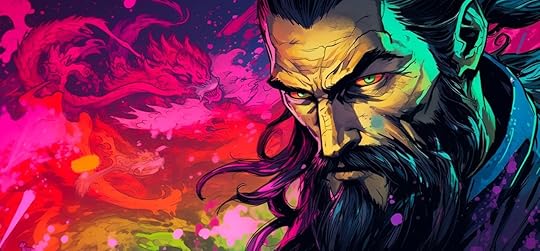
The sorcerer dedicated his entire life to the pursuit of power. His diligence and talent attracted the attention of the Dark Lord himself, who appeared before the sorcerer and entrusted him with a mission to travel to Chinayindu and acquire magical items. In return, the Dark Lord promised Alastar Lupin power that could only be matched by the celestial beings.
If you want to know a little more about Bing Lieu, you must visit his page on Makipedia.

Bricabrac, a Clumsy Sorcerer
Bricabrac was the name of the unlucky sorcerer who traveled through the land of Chinayindu in search of magic. He arrived from the distant land of Yurasiu, following the powerful sorcerer Alastar Lupin.
While Alastar adopted a new name upon arriving in Chinayindu and resorted to considerable cunning, Bricabrac didn’t even bother changing his name. Needless to say, luck was not on Bricabrac’s side.
His robe quickly fell into disrepair, and his short stature and disproportionate width gave the sorcerer an even more unworthy appearance. His face, resembling a rat’s snout, did nothing to improve his looks.
If you want to know a little more about Bricabrac, you must visit his page on Makipedia.
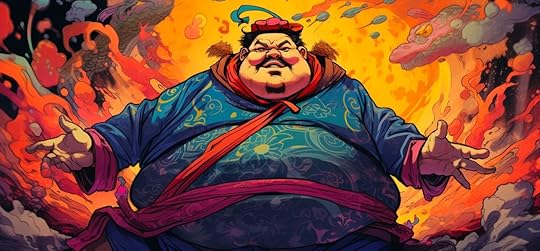
While Alastar adopted a new name upon arriving in Chinayindu and resorted to considerable cunning, Bricabrac didn’t even bother changing his name. Needless to say, luck was not on Bricabrac’s side.
His robe quickly fell into disrepair, and his short stature and disproportionate width gave the sorcerer an even more unworthy appearance. His face, resembling a rat’s snout, did nothing to improve his looks.
If you want to know a little more about Bricabrac, you must visit his page on Makipedia.

Published on November 07, 2023 02:27
•
Tags:
bricabrac, characters, takuan



